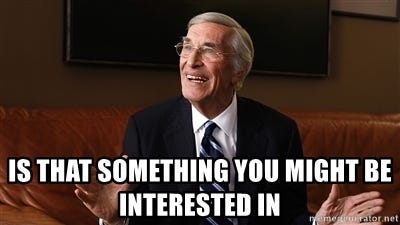JAB and the Family Office Conundrum
"You have to treat these people like sensitive children. They always say it's about the money, but it's not. They just need to feel seen. They wanna be the special child." Armond, The White Lotus
Let me pitch an investment job to you:
Manage a pool of patient capital with the goal of long-term compounding.
A flexible mandate that doesn’t constrain your curiosity and creativity.
Go where you see the most attractive risk-reward.
No heckling by investors. No need for quarterly letters or unwanted publicity for your returns. No risk of key accounts suddenly pulling their capital.
Oh, but also: you have one client and they may fire you at will. Based on your performance. Or because they’ve lost trust in you. Or because, unfortunately, they just don’t like you anymore. It’s unlikely, but possible, that someone’s migraine or conversation at the country club kills your latest venture or even sends you packing.
I’ve worked at two family offices. These were small outfits with less than a dozen employees, mostly investment professionals and accountants, dedicated exclusively to the welfare of one very wealthy family respectively. I grew up in a small town in Southern Germany, unaware of what real wealth looked like. An overt display of prosperity meant parking a Porsche on the street rather than in a secluded driveway. Working for mysterious billionaires with a “go anywhere” strategy seemed exciting.
And while the day-to-day work may have been mundane, I observed a curious phenomenon at both firms. You want your wealth to be managed by talented employees you can trust. But talented investors are typically ambitious and they seek both challenging work and a way to become wealthy themselves. And they are keenly aware of the risk of being at the mercy of a single client. This is the family office conundrum which spawns a quiet maneuvering for power and control.



